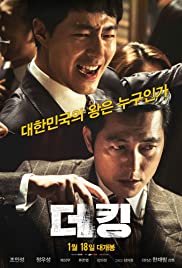
THE KING/ DEOKING
Korea, 2017, 134 minutes, Colour.
In-sung Jo.
Directed by Jae-rim Han.
In the 21st century, the Korean film industry has made quite a number of gangster films but, with many of them, a historical and political connection. This is one of those films.
A non-Korean audience will have some trouble keeping abreast of the characters and the political background and implications. Korean audiences will be remembering and assessing their history.
The film focuses on a young boy, his father a criminal, rather carefree and the boy following in his footsteps. However, he comes across a legal prosecutor and his admiring of what a prosecutor can do, he decides that is what he will do for his own life. He finds it very difficult to study, discovering that as an extrovert he actually performs well in the middle of a crowd or in a bar. When he succeeds, one teacher accuses him of cheating but he proves himself and, over the years, achieves his studies and becomes a prosecutor, working for the government.
A colleague decides to headhunt him for one of the authorities in the prosecutor’s office. The young man is flattered, stands up to the boss, has to complete a case in which he is working which favours the authorities, which leads him into some years of being at home in this kind of world, more and more corrupt as the years go by.
Ultimately, there are political manoeuvres, the young man deciding to stand for office, bringing down his boss, giving press conferences, admitting to his past – but, while he is a King-figure, the film leaves it open as to what happens to him in his future.
1. Korean history, 1980s and 1990s? Politics, the law, corruption?
2. Audience knowledge of the period? The impact for Korean audiences? Worldwide?
3. The opening, the group in the car, the talk, cynical, the accident and the spinning of the car? The common about life appearing before one’s eyes?
4. The flashbacks? The portrait of Park? As a child, difficult upbringing, poverty, his father as a cook, deals, tricks, the food? His wife gone? The boy in trouble? His way of life, seeing the prosecutor and learning about him, the effect, his decision to become a prosecutor? Relationship with friends, their lifestyle, extroverted, clubbing? The difficulty of study, finding that he studied at the club more easily, on the road? Enrolment, lectures, passing, the examiner thinking had cheated, proving himself? Going to the bar, the opportunities, the range of cases, the heavy load, small payment? The encounter with the girl in the past, her protest? Meeting her again, her assurance and poise, the
attraction? Comments about the wedding? The relationship? Her father and his criminal activity?
5. The headhunter, his friendship with Park? Inviting him to the social with An? Opening of the possibilities, the easy and financial life, drugs, women? Park and his stances, confronting Han, slapping him, being accepted? The condition of the casing was working on, dropping it, the financial settlement?
6. His life, his work, the years passing, the consequences of his decision, with the law, deals, finances, his wife and the separation?
7. The rivalries, the entry, this shift into alliances, politics? The violence consequent? Exposure of enemies? Manipulation?
8. The shift in focus from law to politics? Deals, parties, exposure? Park and his decision to stand, his background, his wife? Press conferences? His talking in terms of repentance, changing his life, public concern?
9. The buildup to the boat – and the open ending of the finish with audiences drawing their own conclusions about him, moral judgements, anticipation of his future?